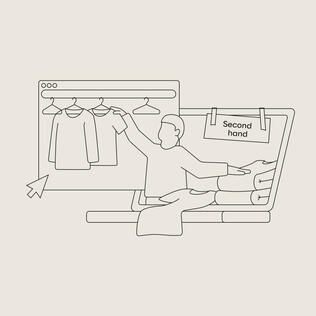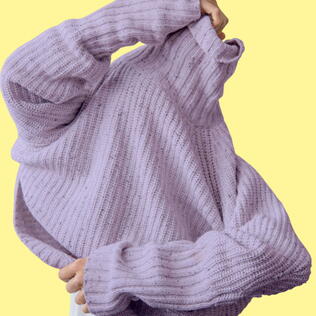CmiA is active in ten cotton-producing countries.
Sustainable cotton: Helping others to help themselves

The Otto Group supports the Cotton made in Africa initiative. It helps smallholder farmers in Sub-Saharan Africa to learn sustainable farming practices for cotton so that they can improve their working and living conditions.
The idea
Many smallholder farmers grow cotton in Sub-Saharan countries such as Mozambique, Zambia, or Tanzania. The carefully handpicked African cotton features relatively long fibers, making it a high-quality raw material that is in demand around the world and can be processed into a versatile yarn. Even so, farmers had it rough for a long time. They struggled with fluctuating world market prices, their productivity was low, and the local infrastructure was poor. Cotton made in Africa (CmiA) is an initiative of the Aid by Trade Foundation which was founded by Prof Dr Michael Otto. Since 2005, CmiA has been helping smallholder farmers in ten Sub-Saharan countries to grow cotton in a more sustainable manner and become part of a large trading network.
The concept
Cotton made in Africa works closely with cotton companies based in Africa. Every two years, independent auditors check whether they comply with the criteria of the CmiA and CmiA Organic standards, such as humane working conditions and sustainable farming practices. The cotton companies provide farmers with training, for example, on basic agricultural practices (more than 850,000 course participants as of April 2021), methods for improving soil fertility (almost 600,000 participants), or the proper use and storage of pesticides (more than 680,000 participants). They learn to tend to their land in a more effective and environmentally friendly manner. The cotton farmer Vainess Chamyolo from Zambia, for example, says she has only been using half the pesticides since her training course. After all, Cotton made in Africa is committed to using pesticides only as a last resort in order to minimize the risks to human health and the environment. CmiA defines a whole range of strategies to continuously reduce the use of highly hazardous pesticides and to fully integrate biological pest control into farming. In all places where pesticides are used, the initiative goes to great lengths to ensure that farmers, their families, and their communities are protected from exposure to these pesticides during storage, handling, application, and disposal. Protecting the environment, in particular by preventing negative effects to bodies of water, is also just as important.
International experts provide on-site training to cotton company employees, who then share their knowledge with smallholder farmers, showing them how to farm cotton in a sustainable and more productive manner. The companies also provide the seeds and buy the crops. At the same time, CmiA develops a market for cotton certified in accordance with the CmiA and CmiA Organic Standards and concludes license agreements with companies that pay a licensing fee for having the CmiA label on the product. Revenue generated by the licenses benefits the people of Africa and the protection of the environment in line with the Foundation’s approach to doing social business. The revenue is invested in the training courses mentioned above, for example.
The assurance process
Both the self-assessment process and the subsequent independent review by third parties are conducted annually. The verification process alternates its focus every year between the cotton fields and the ginneries. The cotton companies must disclose their business activities every year and submit an annual self-assessment of their compliance with CmiA criteria on the cotton fields and in the ginneries. External auditors then use these self-assessments as the basis to check whether work is being carried out on site in accordance with the defined standards. The entire process takes two years. The auditors dedicate the first year to inspecting the working conditions, etc. in the ginneries, while the following year is reserved for inspecting the cotton farming. The cotton companies receive a certificate for an additional two years if they comply with and meet all the criteria. Should the auditors determine that the companies have systematically violated the standards, this may result in them being kicked out of the CmiA network and no longer being able to sell CmiA-licensed cotton.
The impacts
CmiA cotton has a very good environmental footprint and scores very well when compared to the global average for greenhouse gases and fresh water consumption. One kilogram of CmiA cotton only uses two liters of fresh water, whereas the global average is approx. 1,500 liters. This is because CmiA cotton is not irrigated artificially. The production of CmiA cotton releases only 1.24 tons of CO₂ equivalents per ton of harvested CmiA cotton compared to the global average of 1.43 tons of CO₂ equivalents. The main reason for this is that CmiA farmers use relatively little fertilizer and cultivate their cotton under rainfed conditions only. In addition to protecting surface and ground water, rainfed agriculture conserves the energy that other producers have to use for artificial irrigation.
CmiA also has several positive effects on the living and working conditions of cotton farmers. It has been shown that when training courses are carried out on a regular basis with farmers it leads to noticeably higher cotton harvests — and it also contributes to positive cultural shifts in local communities, where awareness among smallholder farmers has grown for the importance of education, gender equality, children’s rights, as well as health and environmental protection through better practices surrounding the handling of pesticides. The CmiA verification process has also proved helpful for the ongoing improvement of the cotton companies’ management abilities, ultimately enabling them to enforce specific standards, such as occupational safety. In relation to comparative data from 2015, evaluation results reveal that the average farming family in Côte d’Ivoire is now earning nearly 18 percent more from CmiA cotton sales. In Zambia, which is another CmiA cotton-producing country, the harvest of smallholder farmers who completed at least three training units was around 23% higher than those who had not completed any training.
Most recent figures (April 2021)
The initiatives supports approx. 1,000,000 smallholder farmers.
Approx. 690,000 tons of sustainable CmiA cotton was produced in 2021.

Over 600 million CmiA-label textiles were brought to market in 2021 in comparison to just 20 million in 2012.
240 spinning mills process the CmiA cotton.
More than 60 retail partners work with CmiA and sell their products worldwide.








